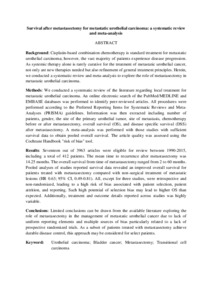Citation
Patel, Vaibhav and Lorduy, Ana Collazo and Stern, Aaron and Fahmy, Omar and Pinotti, Rachel and Galsky, Matthew D. and Gakis, Georgios
(2017)
Survival after metastasectomy for metastatic urothelial carcinoma: a systematic review and meta-analysis.
Bladder Cancer, 3 (2).
121 - 132.
ISSN 2352-3727; ESSN: 2352-3735
Abstract
Background: Cisplatin-based combination chemotherapy is standard treatment for metastatic urothelial carcinoma; however, the vast majority of patients experience disease progression. As systemic therapy alone is rarely curative for the treatment of metastatic urothelial cancer, not only are new therapies needed but also refinement of general treatment principles. Herein, we conducted a systematic review and meta-analysis to explore the role of metastasectomy in metastatic urothelial carcinoma.
Methods: We conducted a systematic review of the literature regarding local treatment for metastatic urothelial carcinoma. An online electronic search of the PubMed/MEDLINE and EMBASE databases was performed to identify peer-reviewed articles. All procedures were performed according to the Preferred Reporting Items for Systematic Reviews and Meta-Analyses (PRISMA) guidelines. Information was then extracted including number of patients, gender, the site of the primary urothelial tumor, site of metastasis, chemotherapy before or after metastasectomy, overall survival (OS), and disease specific survival (DSS) after metastasectomy. A meta-analysis was performed with those studies with sufficient survival data to obtain pooled overall survival. The article quality was assessed using the Cochrane Handbook "risk of bias" tool.
Results: Seventeen out of 3963 articles were eligible for review between 1990-2015, including a total of 412 patients. The mean time to recurrence after metastasectomy was 14.25 months. The overall survival from time of metastasectomy ranged from 2 to 60 months. Pooled analyses of studies reported survival data revealed an improved overall survival for patients treated with metastasectomy compared with non-surgical treatment of metastatic lesions (HR 0.63; 95% CI, 0.49-0.81). All, except for three studies, were retrospective and non-randomized, leading to a high risk of bias associated with patient selection, patient attrition, and reporting. Such high potential of selection bias may lead to higher OS than expected. Additionally, treatment and outcome details reported across studies was highly variable.
Conclusions: Limited conclusions can be drawn from the available literature exploring the role of metastasectomy in the management of metastatic urothelial cancer due to lack of uniform reporting elements and multiple sources of bias particularly related to a lack of prospective randomized trials. As a subset of patients treated with metastasectomy achieve durable disease control, this approach may be considered for select patients.
Download File
![[img]](http://psasir.upm.edu.my/63341/1.hassmallThumbnailVersion/Survival%20after%20metastasectomy%20for%20metastatic%20urothelial%20carcinoma.pdf)  Preview |
|
Text (Abstract)
Survival after metastasectomy for metastatic urothelial carcinoma.pdf
Download (7kB)
| Preview
|
|
Additional Metadata
Actions (login required)
 |
View Item |

